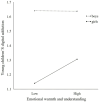Family socioeconomic status and young children digital addiction: a moderated mediation model
- PMID: 39399265
- PMCID: PMC11467755
- DOI: 10.3389/fpsyg.2024.1435575
Family socioeconomic status and young children digital addiction: a moderated mediation model
Abstract
Background: Presently, the problem of digital addiction in young children is becoming more and more prominent, and digital addiction can cause significant harm to the healthy physical and mental development of young children. A growing body of research suggests that family socioeconomic status and parenting styles are associated with digital addiction. However, little is known about the mediating and moderating mechanisms behind this relationship, and few studies have explored whether this relationship holds in young children populations. Therefore, the present study aimed to investigate whether parenting styles mediate the relationship between family socioeconomic status and young children's digital addiction and whether young children's gender moderates this mediation process.
Methods: A cross-sectional study design was used. 403 parents of young children were asked to complete online questionnaires, including the Internet Addiction Test-10 (IAT-10) the Chinese version of the Parenting Style Questionnaire (C-EMBU). The mediation model with moderation was tested using the PROCESS plug-in for SPSS.
Results: (1) Family socioeconomic status is significantly and negatively associated with digital addiction in young children. (2) Parenting styles (emotional warmth and understanding, punishment and harshness) mediate the relationship between family socioeconomic status and young children's digital addiction. (3) Young children's gender moderates the relationship between family socioeconomic status and punishment and severity parenting styles, emotional warmth and understanding parenting styles and young children's digital addiction.
Conclusion: The results indicate that family socioeconomic status can prevent digital addiction in young children through the path of improving parenting styles. However, there is still an overall negative effect of family socioeconomic status on young children's digital addiction.
Keywords: digital addiction; family socioeconomic status; gender; parenting styles; young children digital addiction.
Copyright © 2024 Li, Luo, Duan, Kawulia, Su and Di.
Conflict of interest statement
The authors declare that the research was conducted in the absence of any commercial or financial relationships that could be construed as a potential conflict of interest.
Figures
Similar articles
-
Parenting style and Chinese preschool children's pre-academic skills: A moderated mediation model of approaches to learning and family socioeconomic status.Front Psychol. 2023 Feb 6;14:1089386. doi: 10.3389/fpsyg.2023.1089386. eCollection 2023. Front Psychol. 2023. PMID: 36814671 Free PMC article.
-
Socioeconomic status and problem behaviors in young Chinese children: A moderated mediation model of parenting styles and only children.Front Psychol. 2023 Feb 3;14:1029408. doi: 10.3389/fpsyg.2023.1029408. eCollection 2023. Front Psychol. 2023. PMID: 36818114 Free PMC article.
-
Children With Cochlear Implants and Their Parents: Relations Between Parenting Style and Children's Social-Emotional Functioning.Ear Hear. 2017 May/Jun;38(3):321-331. doi: 10.1097/AUD.0000000000000387. Ear Hear. 2017. PMID: 28002081
-
Family environmental factors influencing the developing behavioral controls of food intake and childhood overweight.Pediatr Clin North Am. 2001 Aug;48(4):893-907. doi: 10.1016/s0031-3955(05)70347-3. Pediatr Clin North Am. 2001. PMID: 11494642 Review.
-
Influence of parental involvement and parenting styles in children's active lifestyle: a systematic review.PeerJ. 2023 Dec 21;11:e16668. doi: 10.7717/peerj.16668. eCollection 2023. PeerJ. 2023. PMID: 38144179 Free PMC article.
Cited by
-
Association Between Family Upbringing Environment and Mobile Phone Dependence Syndrome in Middle School Students - Guangzhou City, Guangdong Province, China, 2023.China CDC Wkly. 2025 Aug 1;7(31):1014-1023. doi: 10.46234/ccdcw2025.173. China CDC Wkly. 2025. PMID: 40831615 Free PMC article.
References
-
- Akhter M. S., Islam M. H., Momen M. N. (2020). Problematic internet use among university students of Bangladesh: the predictive role of age, gender, and loneliness. J. Hum. Behav. Soc. Environ. 30, 1082–1093. doi: 10.1080/10911359.2020.1784346 - DOI
-
- Álvarez M., Torres A., Rodríguez E., Padilla S., Rodrigo M. J. (2013). Attitudes and parenting dimensions in parents’ regulation of internet use by primary and secondary school children. Comput. Educ. 67, 69–78. doi: 10.1016/j.compedu.2013.03.005 - DOI
-
- Anandari D. R. (2016). Permissive parenting style and its risks to trigger online game addiction among children, Asian conference 2nd psychology & humanity (pp. 773–781). Available at: https://mpsi.umm.ac.id/files/file/773-781DwiRezkyAnandari.pdf
-
- Andreou E., Svoli H. (2013). The association between internet user characteristics and dimensions of internet addiction among Greek adolescents. Int. J. Mental Health Addict. 11, 139–148. doi: 10.1007/s11469-012-9404-3 - DOI
-
- Bronfenbrenner U. (1986). Ecology of the family as a context for human development: research perspectives. Dev. Psychol. 22, 723–742. doi: 10.1037/0012-1649.22.6.723 - DOI
LinkOut - more resources
Full Text Sources




